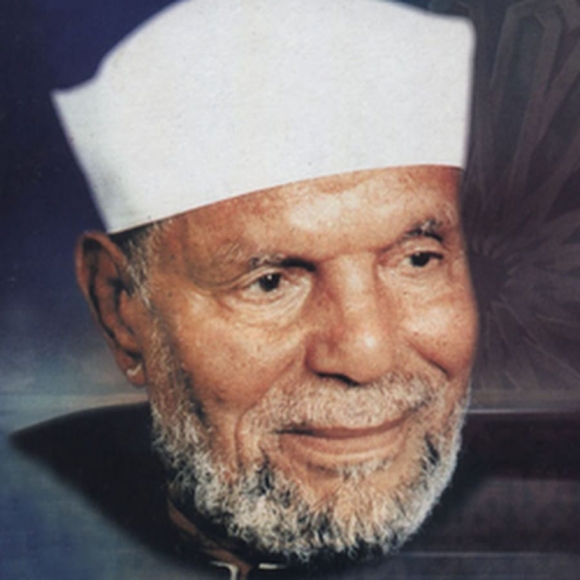Home > About the Author
About the Author

Mohammad Mutwali AlSherawi (محمد متولي الشعراوي) was born in 1911 to a farming family in a small village in Egypt. He was well learned, and throughout his childhood and adult education he excelled in poetry and literature. His talents did not pass unnoticed by his father who wanted to send him to complete his higher education in Al-Azhar, one of the most prestigious Islamic institutes at the time. Mohammad, however, had different plans in mind. He wanted to stay and help his family farm the land. Sensing his child’s potential, the father kept the pressure on. In an attempt to change his father’s mind, Mohammad asked him to buy all the major references in literature, culture, Arabic language, and Islamic studies. These were valuable books, and not cheap by any means. Despite the financial burden, his father came through, and bought him all the books he asked for knowing well that they were not part of Al Azhar's curriculum.
Mohamed excelled in his studies, and read far beyond what was asked of him. He enjoyed the Arabic language, poetry, and was well known for his ability to express his ideas in a clear and simple manner.
He graduated in 1943 and held several teaching jobs until he moved to Saudi Arabia in 1950 to work as a professor of religious studies in the University of Mecca. In 1963 he moved back to Egypt and held a high position at the Al Azhar. And in November of 1976 he was appointed by the Egyptian prime minister to head the ministry of religious affairs. One of his first achievements as a government minister was to establish the first Islamic bank in Egypt.
Al-Sherawi's method in explaining and reflecting upon the Quran depended on several sources. First, he relied on his thorough knowledge of the Arabic language and its intricacies. Second, He drew on his comprehensive knowledge of the entire text of the Quran, and third he focused on the social applications and everyday life lessons of the holy text. He also took special care to answer those who attacked or attempted to discredit verses of the Quran.
His ability to use clear and simple examples and to illustrate deep philosophical issues in an easy to understand manner helped him reach vast audiences of different social and educational backgrounds. His TV series reruns on many television channels to this day. It is this ability to reach the masses over decades is what we will try to tap into.
Al-Sherawi passed away in the summer of 1998. His funeral was broadcast live and attended by tens of thousands of admirers.
Notable Academic & Leadership Positions:
- He was appointed a teacher at the Tanta Azhari Institute and worked there, then transferred to the Institute of Alexandria, then the Institute of Zagazig.
- He took a sabbatical to work in Saudi Arabia in 1950. He worked as a teacher at the Faculty of Sharia, King Abdul-Aziz University in Jeddah.
- He was appointed as an adjunct professor of the Tanta Azhari Institute in 1960.
- Appointed director of the Islamic Call the Ministry of Awqaf 1961.
- He had been employed as an Arabic Sciences monitor in Holy Azhar in 1962.
- Appointed Director of the Office of the Grand Imam Sheikh Azhar Hassan Mamoun 1964.
- He was appointed Head of the Al-Azhar Mission in Algeria in 1966.
- Appointed as a visiting professor at King Abdul Aziz University, Faculty of Sharia, Mecca, 1970.
- Appointed Head of the Department of Graduate Studies at King Abdul-Aziz University in 1972.
- He was appointed Minister of Awqaf and Al-Azhar Religious Affairs in the Arab Republic of Egypt in 1976.
- Appointed a member of the Islamic Research Complex, 1980.
- He was named a member of the Shura Council, Egypt 1980.
- He was offered the Al-Azhar sheikhdom as well as a position in a number of Islamic countries but he refused and decided to devote himself to the Islamic call.
Major Works:
Books
- Israa and Mi'raaj
- Miriam & the Messiah
- Secrets of ‘In the name of Allah, the Most Beneficent, the Most Merciful’
- Islam and Modern Thinking
- Islam and Women: curriculum and religion
- Prayers and Pillars Islam
- The Path to Allah
- Rulings - Fatwa
- Hundred Question and Answer in Islamic Jurisprudence
- The Miracle of Quran
- This is Islam
Television
Perhaps his greatest work and most recognizable achievement was a televised Series called "Reflections upon the Quran.” The television show started to air in 1980 with the first few episodes covering his vision and method in explaining the Quran. This was followed by his reflections upon each verse of the Quran starting from the very first chapter. His TV appearance spanned over 10 years and covered more than two thirds of the Quran. His death however, prevented him from completing the entire text. The show still airs to this day and is watched by millions in the Arab world.
Notable Honors & Rewards:
- Honorary PhD in Literature from Al-Manufia University
- 1988 Recepient: The Egyptian Presidential Medal
- 1991 Honorary PhD in Literature from Al-Mansura University
- 1997 Dubai International Award for Service to the Nobel Quran
- 1998 Posthumous Highest National Medal of Honour